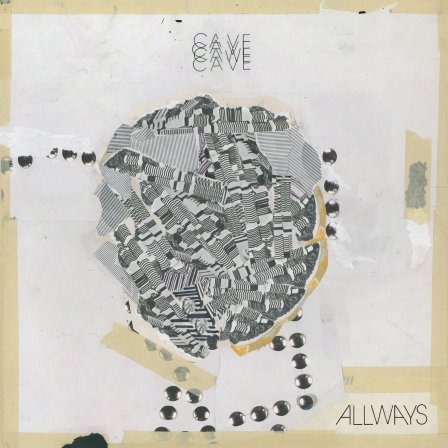The video for “San’ Yago” from CAVE’s new album Allways is a montage of hot dog eateries from around the band’s hometown of Chicago shot in gauzy 16mm. It’s subtly bold, a flag cast high for the Midwest, the restaurants acting as a stand-in for a complicated but acute brand of civic pride that comes from living in a place like Chicago. For locals (or expats, like myself), it becomes a game to see how many you’ve eaten at. Guitar and bass riff rhythmically on a single note, while a keyboard lays out a two-chord progression that slowly develops until the band breaks into a unison vocal line, wordless but buoyant. Drums bounce playfully but steadily, foregrounded in the mix. It’s a perfect distillation of CAVE — their mellow intensity and the context from which they emerge.
CAVE exist within a rich, diverse, and perpetually blooming underground Chicago music community, guided by a spirit of exploration and genre-agnosticism that’s rarely such an ingrained part of a city’s musical character. Over the past decade, the band has emerged as a unifying presence in Chicago’s musical ecosystem, thanks to both the band’s elastic definition of what a rock band does and its phenomenal live shows, which showcase the group’s ability to play precise music with a looseness that belies its intricacy. Guitarist/keyboardist Cooper Crain, also of drift perfectionists Bitchin Bajas, has further helped define the city’s sound by engineering or mixing scores of records from Chicago musicians, including Ryley Walker, Circuit des Yeux, Matchess, Mind Over Mirrors, ADT, Joshua Abrams, and Running.
Allways is CAVE’s fourth full-length and arrives five years after Thrace, which showed the band restraining its more overt psychedelic tendencies and adding Bajas windman Rob Frye. That quintet returns here, and the band’s focus on extended groove remains the foundation of the music. Change happens incrementally for CAVE, in the large and small scale. Their songs develop linearly, often driven by subtle rhythmic complications over purely melodic ones. Those progressions are informed more by minimalism and the percussion traditions of Africa and Latin America than conventional rock structures, while still retaining the energy and constituent elements of rock music.
Opener “The Juan” moves through several distinct sections that evolve as developing motifs lock into place at just the right moment. After a short intro of muted guitar and syncopated drum hits, the music stops before bursting forth with a melodic bass riff that carries the tune under bright pads of synth. As the guitars establish interlocking riffs, Frye’s flute floats above, darting around before suddenly snapping together into a descending melody. Elsewhere, the grooves become a backdrop for both spontaneous explorations and straight-up jams. The 10-minute slow-burn “Beaux” leans most overtly toward a more established Krautrock template, giving Crain an opportunity to indulge in fuzzy leads. “Dusty” seems poised to explode into a wah-fueled free-for-all, but is expertly reigned in. Throughout, drummer Rex McMurry establishes and maintains the mood of each song, giving the other instrumentalists the space to build on the basic template he lays down.
With the exception of the increased usage of their own voices, there are few surprises on Allways. But with an approach so pliable and unique, a band like CAVE doesn’t need to reinvent itself on each record, because the core of what it does is already so innovative. Allways, then, is simply a welcome return from one of Chicago’s most consistent artists, reaffirming their primacy among contemporary exploratory rock bands.

